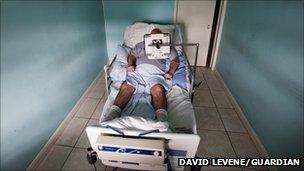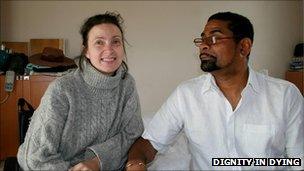Man's fight for 'equality' over assisted suicide guidelines
- Published

Martin wants assurances that his doctors and lawyers won't be prosecuted for helping him
A man who is almost completely paralysed is taking legal action in a bid to end his life. His solicitors have told the BBC that they believe his case could have major implications for the way prosecutors in England, Wales and Northern Ireland deal with assisted suicides.
The man, who to protect his family obtained a court order preventing his real identity being revealed, is known simply as "Martin".
He's 46 and suffered a severe stroke three years ago. Campaigners against assisted suicide are already expressing concern that his case could weaken the protection offered by the law.
Martin lies in a bed. He can just about move his head, has slight movement in his arms, toes and throat but he cannot speak. He makes some grunting noises and communicates through a computer.
He stares at letters on the screen and a computerised voice talks for him.
He used to be a keen rugby player and cyclist. In 2008, he suffered a brain stem stroke. He now has to rely on full-time carers who help him with every aspect of his life.
Within months of the stroke, he decided he no longer wanted to continue living. When asked in an interview with BBC Radio 4's PM Programme, he spells it out - via the computer - "d-e-a-t-h".
He says he wants to go to the Dignitas clinic in Switzerland. At least 160 British people have already done that but he would need help to get there.
'Not who I am'
His wife says she understands Martin's desire to die but is unwilling to help in any way.
Also speaking to PM, she said: "I can understand his wish to die but I find it very difficult to come to terms with that. I'm not prepared to help him, as for me I would find that very hard to do and to live with the consequences.
"I think about it, but I just couldn't - its not me. It's not who I am. I just couldn't do it.
"I couldn't be responsible for somebody else's life. But I am prepared to be with him during the process - to give him support and because I love him".

Updated prosecution guidelines on assisted suicide were published after Debbie Purdy's legal battle
As his wife will not be involved, Martin is likely to have to rely instead on medical experts, solicitors or even strangers to help him - and all could face a high risk of being prosecuted.
Assisting suicide is against the law but last year the Director of Public Prosecutions published guidance, external for use by prosecutors in England, Wales and Northern Ireland.
They outline "public interest factors" in favour and against prosecution, depending on different circumstances. This followed a case brought by Debbie Purdy who has progressive multiple sclerosis.
The guidelines have been interpreted as providing some reassurance to family members who help relatives to die.
One of the factors against prosecution is where a suspect is "wholly motivated by compassion".
'Discrimination'
However, prosecution could be more likely if the person involved is "acting in his or her capacity as a medical doctor, nurse, other healthcare professional, a professional carer (whether for payment or not), or as a person in authority..."
As Martin does not have a close family member who is willing to give him the assistance he wants, he is challenging the guidelines. His solicitors feel he is being discriminated against.
His initial application to the High Court is seeking assurance that his legal representatives and other experts won't face prosecution or professional disciplinary procedures as a result of helping him, even at this early stage.
His lawyer Richard Stein, of Leigh Day & Co, said: "As a lawyer I face the rather crazy position where I'm not even certain that it's lawful for me to advise my client, whereas if I was a relative or a friend I could arrange his membership of Dignitas.
"I could book his appointment. I could go with him and come back and be confident that I wouldn't face prosecution."
'Pressure to die'
However some disability groups are concerned that the guidelines are already too lax and that if Martin wins, the situation will be made even worse.
The chief executive of Scope, Richard Hawkes told the BBC: "We understand why Martin feels the way he does. This is a highly complex and emotional situation.
"But if this case is won it could lead to a weakening of the protection offered by the law and there are many disabled people who might be worried about that and might feel this could lead to situations in which they are put under pressure to end their own lives."
Martin responds by saying critics should try living like he does. Through his computer he told the BBC: "They haven't a clue."
His preliminary legal papers have been lodged with the High Court and an anonymity order has been issued. The case will raise many difficult and controversial questions but Martin claims he is clear what he wants: "Life is not worth living," he says.
- Published16 April 2011
- Published14 June 2011